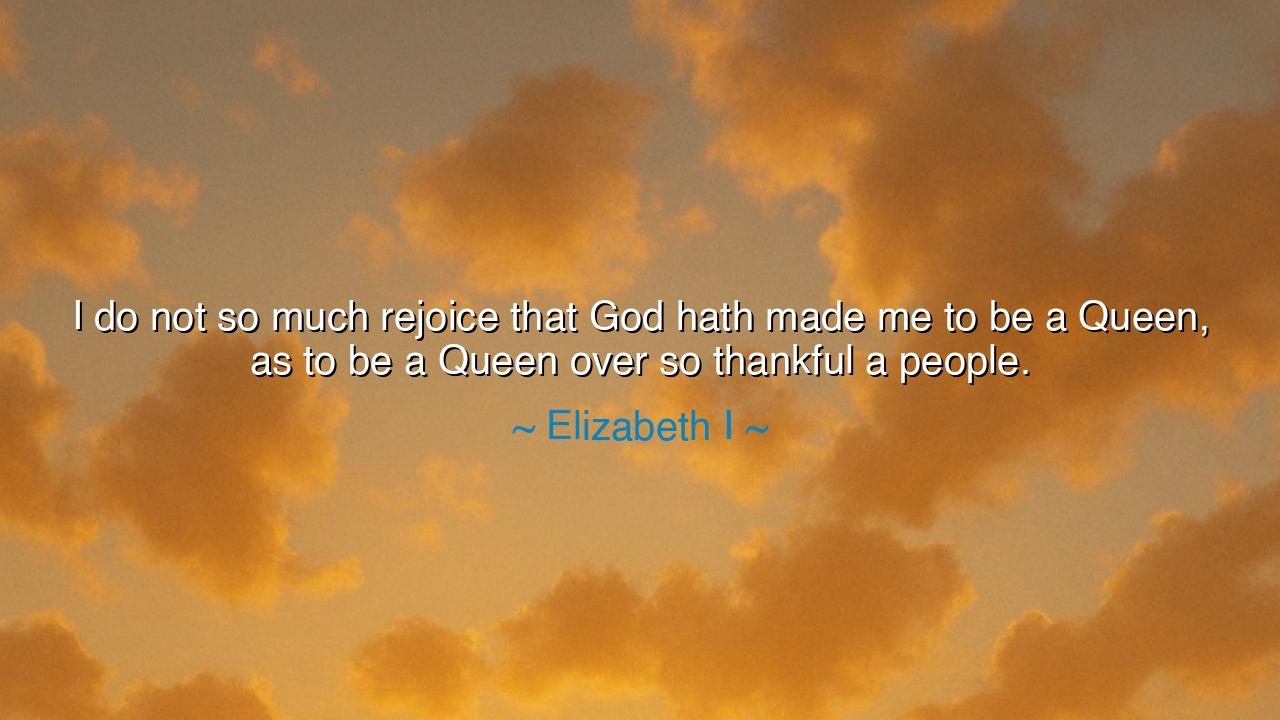
I do not so much rejoice that God hath made me to be a Queen, as
I do not so much rejoice that God hath made me to be a Queen, as to be a Queen over so thankful a people.






Elizabeth I, the great Queen of England, uttered these moving words in her reign: “I do not so much rejoice that God hath made me to be a Queen, as to be a Queen over so thankful a people.” Here, she unveils the essence of true leadership and the secret joy of a sovereign. For what is a crown worth if worn over a land of ingratitude? What are thrones and titles if the hearts of the people are not bound in loyalty and thanksgiving? Elizabeth’s greatness lay not in the glitter of power, but in her recognition that the noblest treasure of a ruler is the love and thankfulness of her people.
To rejoice in being Queen is natural, for power, honor, and renown are heavy gifts. But Elizabeth, with wisdom, rejoices even more in her people’s gratitude, for it meant her reign was not one of compulsion but of harmony. A ruler who governs only by fear may command obedience, but never the soul. Gratitude, however, binds subjects to their sovereign with ties stronger than iron—ties of affection, trust, and reverence. Thus, she saw her truest crown not as gold upon her brow, but as the thankfulness of her people resting upon her heart.
The words echo an eternal truth: leadership is fulfilled not in dominion, but in relationship. The mightiest armies cannot secure what gratitude freely gives. A people that bless their ruler sustain her in joy; a ruler who values their gratitude rules with humility. Elizabeth knew well the storms of treachery, the weight of war, the trials of religious strife. Yet when her subjects returned her sacrifices with thanksgiving, she found in their loyalty a balm greater than victory itself.
History bears witness to this. After the defeat of the Spanish Armada in 1588, Elizabeth addressed her troops at Tilbury, declaring that though she had “the body of a weak and feeble woman,” she had “the heart and stomach of a king.” The victory that followed was not hers alone—it belonged to a nation united in courage and devotion. The people’s gratitude for her leadership made her triumph not only military but spiritual, binding her name forever to the glory of England. Truly, she rejoiced not only in being queen, but in being queen over a thankful people who shared her struggles and her triumphs.
The ancients understood this as well. Marcus Aurelius, though emperor of Rome, confessed that true joy was not in ruling vast lands, but in serving the welfare of the people. A kingdom without gratitude is hollow, but one where the ruler and the ruled honor each other creates a bond that endures through the ages. Elizabeth’s words, then, stand as part of this great chorus: power alone does not exalt a leader—gratitude does.
The lesson for us is clear: in whatever station of life we lead—whether in family, in work, in community—we must seek not only authority, but the gratitude of those we serve. Leadership divorced from gratitude is tyranny, but leadership joined with thankfulness is love in action. Just as Elizabeth valued her people’s gratitude above her crown, so too must we treasure the bonds of appreciation and loyalty that make every relationship sacred.
Practically, let us live this by giving thanks for those who follow and by striving to earn their gratitude through service, fairness, and humility. Parents, rejoice not only in the authority of parenthood, but in the love and gratitude of your children. Teachers, seek not only obedience, but the heartfelt appreciation of your students. Leaders, strive not for fear and control, but for gratitude born of respect. In this way, your crown, like Elizabeth’s, will be gilded not by gold, but by love.
Thus, Elizabeth I’s words resound across the centuries: it is no great thing merely to be made a Queen, but a wondrous thing to reign over a thankful people. May we, too, live in such a way that our authority—great or small—is sanctified by gratitude, and may we always rejoice more in the love of others than in the empty glitter of power.






AAdministratorAdministrator
Welcome, honored guests. Please leave a comment, we will respond soon